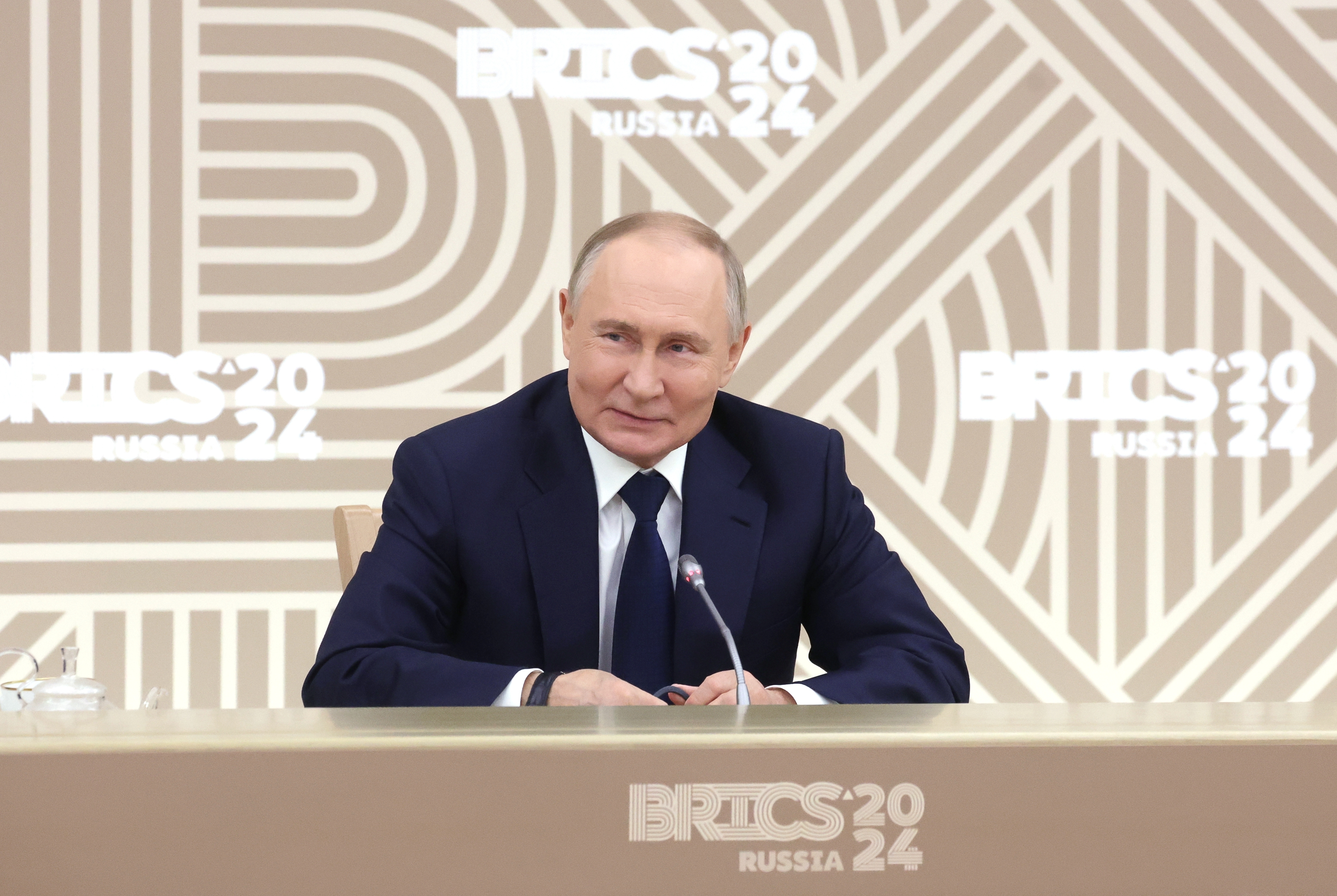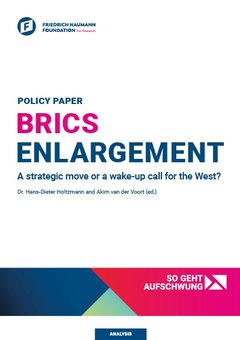BRICS 2024
The BRICS Summit 2024 in Kazan - a world stage for Putin?

From 22-24 October, it is the turn of President Vladimir Putin to host the 16th BRICS summit.
© picture alliance / ASSOCIATED PRESS | Vyacheslav ProkofyevWhile the finance ministers and central bank governors are meeting in Washington this week for the traditional autumn meeting of the IMF and World Bank, a different kind of summit is taking place in Russia at the same time. From 22-24 October, it is the turn of President Vladimir Putin to host the 16th BRICS summit. A total of 32 foreign delegations from all over the world are expected to attend, 24 of them at the level of heads of state and government, including all of the nine BRICS members to date, as well as numerous other countries interested in membership, including with Turkey for the first time a NATO member state. It has not yet been confirmed whether UN Secretary-General António Guterres will also accept the Russian invitation to attend the summit. The summit was preceded by over 200 meetings and events over the course of 2024, which were organised by the Russian Presidency.
Kazan as a summit venue with dubious symbolic power
Putin is hosting the summit in Kazan, the capital of the Muslim-dominated republic of Tatarstan. The choice of location was intended as a symbolic sign of Russia's anti-imperial orientation and solidarity with the ‘Global South’ against the Western colonial powers. The irony, however, is that Russia itself conquered most of its territory through the colonisation of Siberia, the Caucasus and Central Asia and the Tatars were one of the first peoples to be subjugated. To this day, they, like all other national minorities in the Russian Federation, are centrally controlled and dominated from Moscow.
Russia's anti-Western course in BRICS controversial
For Putin, the summit is the most important foreign policy event of the year and he wants to use it to present himself on the world stage as a leader who is not internationally isolated, but who, with the BRICS states, represents the future ‘world majority’ (in terms of population and resources) and wants to enforce a multipolar world reorganisation against rule-based multilateralism. In order to emphasise its claim to a prominent geopolitical position, Russia redefined the ‘world majority’ as the ‘Global South and Global East’ in the run-up to the Kazan Summit, whereby Russia sees itself alongside China as the leading power of the ‘Global East’. In addition to the geopolitical significance of the meeting, economic cooperation and free access to new markets as well as the creation of new financial and settlement instruments that are not dominated by the West are of particular interest to Russia, which is subject to comprehensive Western economic sanctions due to the war against Ukraine. Both are reflected in the motto of the presidency, which reads: ‘Strengthening Multilateralism for Equitable Global Development and Security’.
However, there is a wide gap between Russian aspirations and reality in many respects. Russia's intention to position the BRICS states as an alternative to the G7 and to pursue a strictly anti-Western course is meeting with resistance. Both the BRICS founding members India and Brazil as well as the new members (with the exception of Iran) and many of the candidates are pursuing a multi-vectoral foreign and economic policy, which also explicitly includes the continuation of bilateral cooperation with the West. This also applies decidedly to the countries of Central Asia and the South Caucasus, which Russia counts as part of its sphere of interest and influence. Kazakh President Kassym-Jomart Tokayev declared immediately before the Kazan summit that his country would not be applying for BRICS membership in the foreseeable future ‘due to the development prospects of this association’. His press spokesman added that, in the national interest, Kazakhstan gives priority to the ‘UN as the universal organisation with no alternative, in which all current international problems can and must be discussed’. Armenian President Nikol Pashinyan, who is attending the summit at Putin's invitation, also made it clear that his country is not seeking membership of BRICS. Russia also wants to use its BRICS status to expand its influence in Europe, e.g. in the Balkans. But even Serbian President Aleksandar Vucic, who was personally invited to the BRICS summit by Putin, is reported shying away from attending and to only send a representative.
Admission of new members in Kazan unlikely
In any case, the integration of the four countries newly admitted since the beginning of 2024 (Egypt, Ethiopia, Iran and the United Arab Emirates) does not appear to be progressing smoothly due to heterogeneous political and economic interests. In addition, Saudi Arabia is still considering officially joining BRICS and will only be represented in Kazan at foreign minister level. On behalf of the Russian Presidency, Foreign Minister Sergei Lavrov stated on the fringes of the UN General Assembly in New York at the end of September that the task is to integrate the new members quickly and effectively into the BRICS structures. However, as this is difficult, he said that no further new members would be accepted at the Kazan summit, although more than 30 applications and/or expressions of interest had been submitted. Instead, a ‘partner status’ is to be established which - according to criteria to be defined in Kazan - will enable qualified countries to participate in the various BRICS formats, albeit without voting rights.
BRICS enlargement - a "non-event" or a stage victory against the West?

The enlargement of the BRICS group at the beginning of the year to include five new member states raises questions about the political and economic consequences. What do the existing members expect from the expansion? What do the new ones expect? What does BRICS enlargement mean for the West, and what could a liberal response to this look like?
Aiming for greater independence from the dollar, but how?
The second important concern of the Russian presidency has been the promotion and development of alternative financial instruments and clearing systems in order to minimise dependence on Western currencies, particularly the dollar, as well as the SWIFT system and the associated sanction risks. The creation of a BRICS common currency has so far proven to be unrealistic due to the very different economic and financial structures and monetary interests of the individual BRICS members. Or as Jhanvi Tripathi, Observer Research Foundation, put it at a BRICS webinar organised by FNF South Asia: ‘BRICS is not even a single market yet.’
Instead, work is now primarily focussing on the creation of payment and settlement systems (BRICS Pay) for the use of national currencies. To this end, a BRICS Pay Consortium has been formed to develop solutions for private customers/retail (BRICS Pay QR), business customers (BRICS Pay B2B) and BRICS Clear (intergovernmental digital settlement system for cross-border securities transactions based on blockchain technology). Russia and the BRICS new member Iran, both of which are subject to strict sanctions by the West, have a strong interest in alternative payment and settlement systems that are not controlled by the West. In contrast, the other BRICS members, which have active trade relations with the West, are only interested in a certain degree of de-dollarisation and the introduction of settlement with national and digital currencies to a limited extent and only to the degree that it offers protection against sanctions and secondary sanctions and can facilitate the attraction of additional investments. Therefore, due to the different starting points and interests as well as the technical challenges, a long coordination and implementation process is to be expected here as well.
Broad summit agenda, but concrete resolutions unlikely
Other topics that the Russian Council Presidency has put on the summit agenda this year include
1. cooperation in the field of information security and the development of a code of ethics for the application of artificial intelligence
2. cooperation in the fight against corruption and capital flight, taxation and customs
3. cooperation for sustainable development; pursuit of an energy transition concept (from fossil to green energy) prioritising national economic interests over climate goals
4. establishment of a BRICS Medical Association to create an early warning system for infectious risks and epidemics.
Both the breadth and order of prioritisation as well as the very different views and approaches of the individual BRICS members in all of these areas indicate that the Kazan Summit will not adopt any directly implementable resolutions in this regard.
Conclusion
Overall, it can be expected that the summit in Kazan will essentially be an opportunity for Putin to present himself to the (BRICS) world as an international host, after his travelling radius has been limited to China, North Korea and Vietnam due to sanctions since Russia's invasion of Ukraine. Even if new members are not yet expected to be admitted in Kazan (beyond the new category of ‘partner status’), the growing global interest in BRICS membership must be reason enough for the West to strategically monitor the further development of BRICS and to cooperate more closely with the ‘Global South’ politically and economically on its own initiative, especially with countries such as Brazil and India that are not fundamentally anti-Western in orientation, as set out in the latest FNF Policy Paper on BRICS enlargement.


